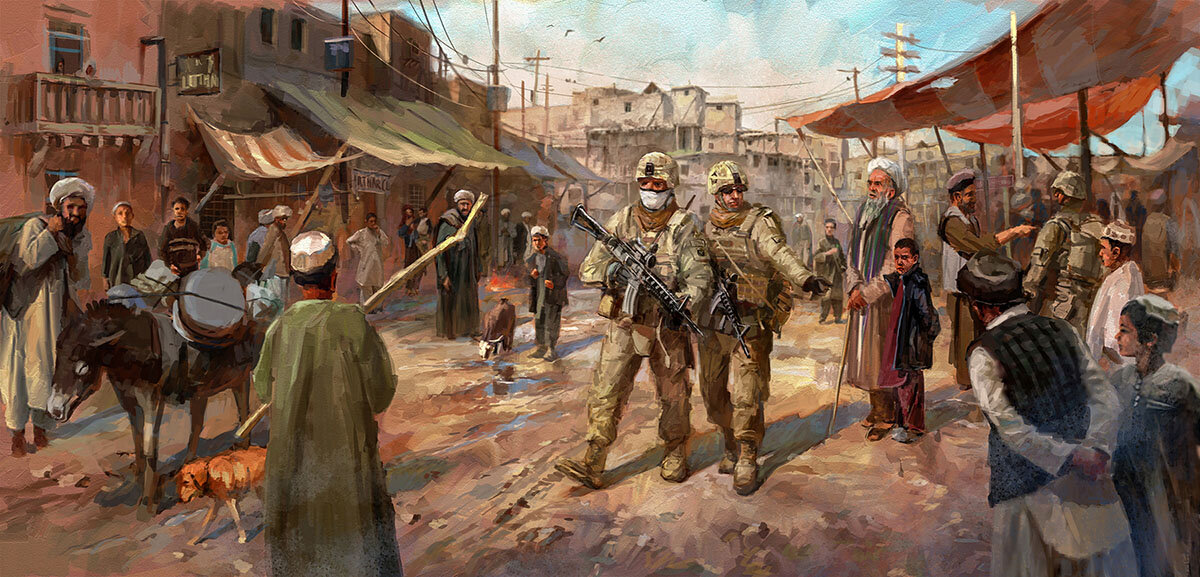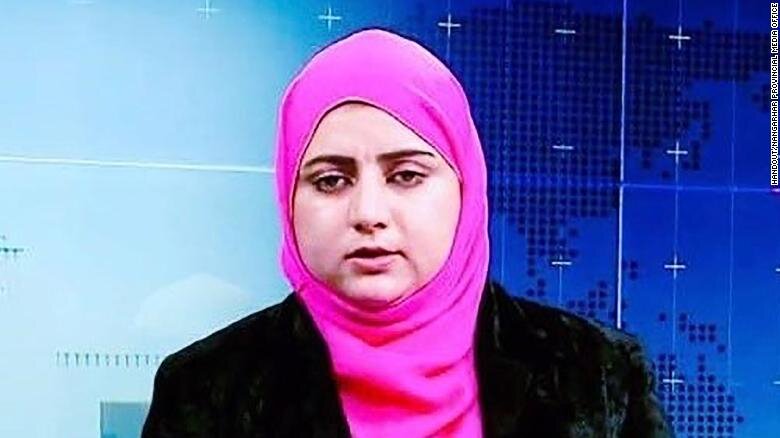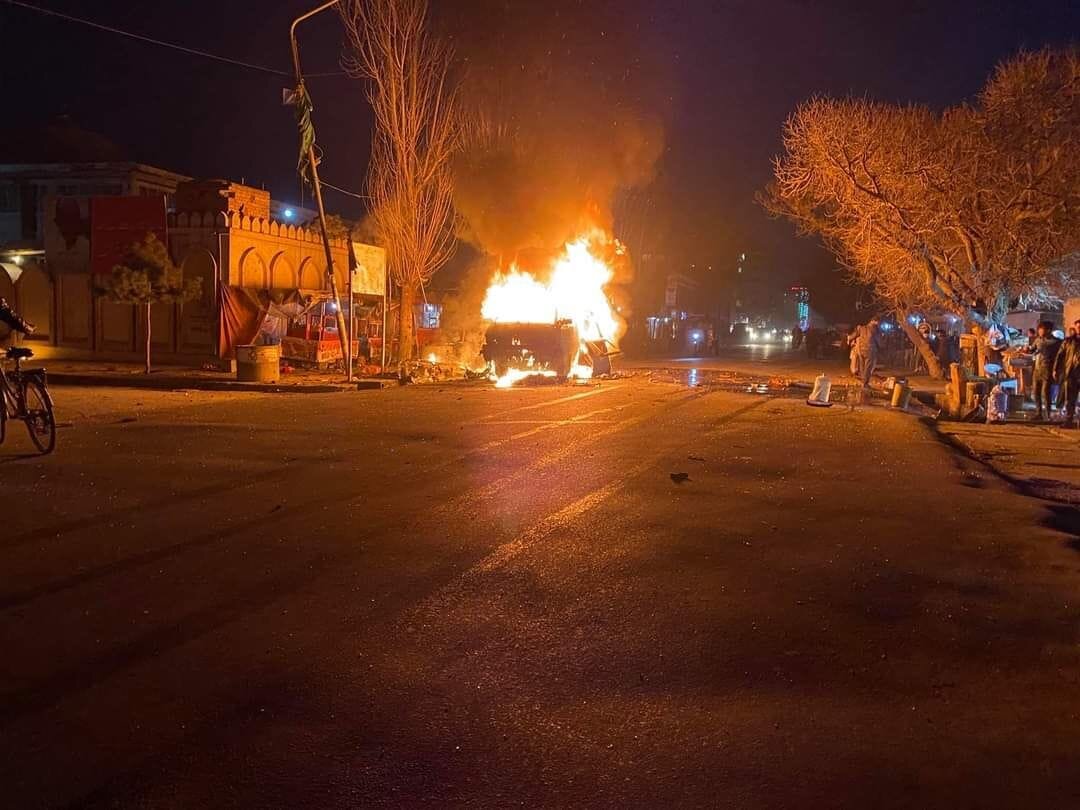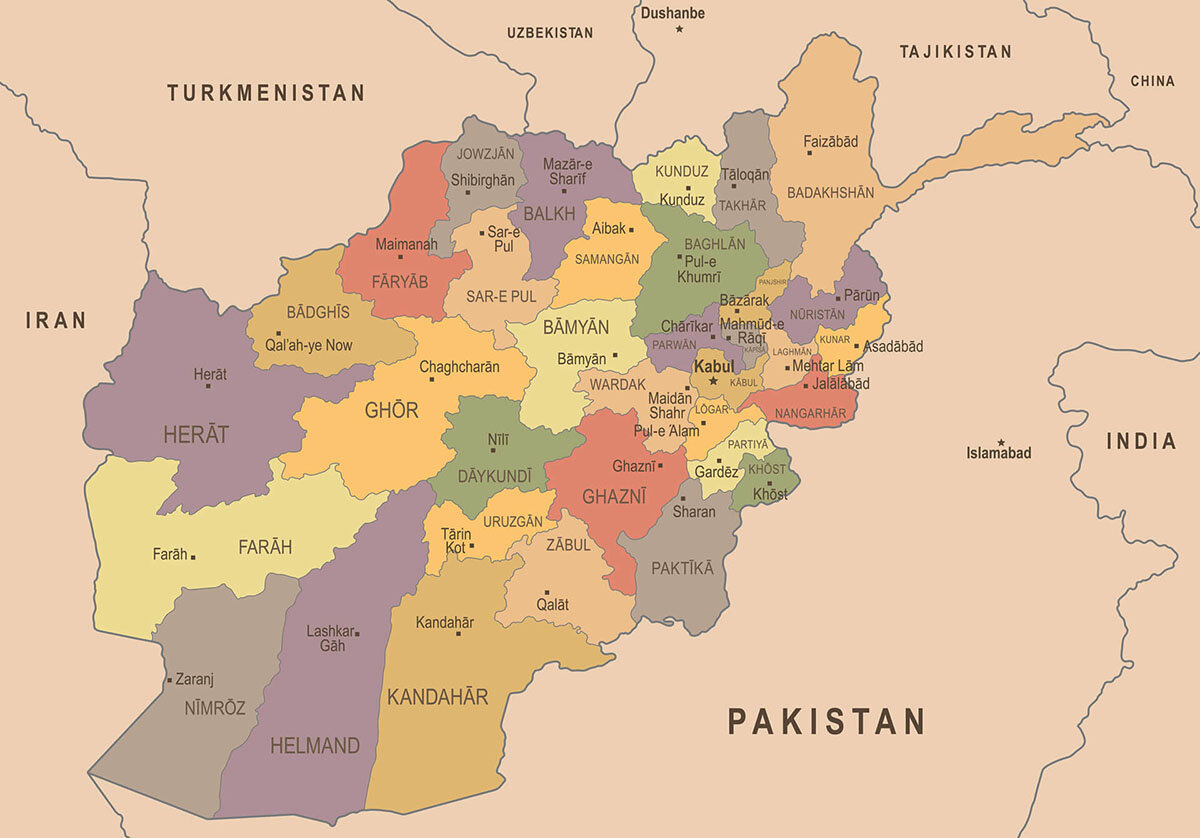
Charlie Faulkner
A call from a police commander in Ghazni, a city 150 kilometers south of Kabul, assures the man on this end of the phone that his family members are safe. The commander’s assurances help but haven’t assuaged his anxiety—Mohsen*, an Afghan journalist in his late twenties, has been forced to flee across the country to a different city for the sake of his own safety. The previous evening, gunmen surrounded his home with his family inside. Having already received threats from the Taliban, he assumes it was them but can’t be sure. The commander has deployed officers to secure the house.
“The situation in Ghazni wasn’t bad until the beginning of 2020,” says Mohsen. “We went to Taliban-controlled areas without difficulty. But then things started to change.”
His colleague Rahmatullah Nekzad, who was the head of the Ghazni journalist association, was shot dead in December — it was a deciding factor for Mohsen. “In the lead up to his death, he pleaded with us to find safety, warning that we journalists would be targeted. He lost his life in front of his family.”
Mohsen fled Ghazni at the beginning of the year, which also meant leaving his job. Not being able to work adds pressure to an already tense situation — he is struggling to support his family financially in addition to being unable to physically protect his wife, children and extended family members. He admits he is not coping well and is suffering from depression. What makes it harder is the uncertain future, for no one knows how long this will go on.

“People in Afghanistan need the help of journalists to give their voices a platform. If journalists are silent then society will be silenced,” says Mohsen.
In recent months, many of Afghanistan’s journalists have been hunkering down in safe houses away from family, or are desperately attempting to flee the country, as they become the targets of a terrifying assassination campaign. For those who don’t have the luxury of escape, self-censoring is the only option. The attacks, carried out through the detonation of IEDs and close-range shootings, plague Afghanistan at a time when the country is attempting to navigate its way through peace negotiations and the withdrawal of foreign troops. Many Afghans believe that now more than ever, a free and independent press is particularly vital.
Sixty-five journalists, media professionals and human rights defenders were killed in Afghanistan between the 1st of January, 2018 and January 31, 2021, according to the United Nations Assistance Mission in Afghanistan (UNAMA).
Meanwhile, 132 threats and cases of violence against journalists and media workers during 2020 have been documented by the Afghan Journalist Safety Committee (AJSC) — an increase of 26 percent compared to 2019. The threats come from different factions, from government officials, the Taliban, ISIS and militia groups.
Earlier this month, three women journalists were slain in separate attacks in Jalalabad, in eastern Afghanistan. ISIS claimed responsibility, justifying their murders because they worked for one of the “media stations loyal to the apostate Afghan government.” The women all worked for Enikass Radio and TV. In December, another woman working for the media outlet was killed by ISIS. The broadcaster has now said it can no longer hire women because it is unable to guarantee their safety; Enikass blames the lack of security on the government. And has advised its female employees to work from home. The revelation received mixed responses across social media; this is a devastating blow to the slow but hard-fought progress made towards women’s rights and equality across the country. Now, those small gains are at grave risk of being completely wiped out.
Security concerns have led to more than 300 Afghan women journalists quitting their jobs in recent months, says the International Federation of Journalists. And a recent survey by the AJSC indicates an 18 percent drop in the number of women working in media over the last six months.
Another journalist who has fled his home, his family and his job for his protection in the southeastern town of Helmand says he has been forced to delay his wedding amid threats from the Taliban. He has no idea when he might be able to return home and get married. His fiancé must just wait patiently until it is deemed safe enough for him to return.
“I was due to get married a month ago,” he says, asking for his name not to be published. “My fiancé is very worried about me but not having the constant pressure affecting me the way it was when I was still in Helmand has been a relief. I’m angry that the situation is like this – that so many people’s lives are under threat.”

The mounting losses Afghan journalists have suffered are heartbreaking—so many of them have had to cope with the death of not just one or two, but several friends working in the industry.
The assassination campaign is relentless.
Sidiqullah*, a journalist in his late thirties from Helmand, came terrifyingly close to being killed when a car he had been traveling in was blown up. He had stepped out of the vehicle and walked a few meters away. Tragically, his friend and peer Nematullah Zaheer, formerly a television reporter at Afghanistan’s Ariana news, was still in the car at the time of the explosion. All told, Sidiqullah has lost five colleagues, the most recent being his childhood friend Aliyas Dayee, who worked for US-funded Radio Free Europe/Radio Liberty network.
“We received threats by letter, through social media — the Taliban spokesman directly threatened me. I’ve been accused of being a spy for foreign countries. We have no idea when we will be free from these threats,” says Sidiqullah.
“Everybody is afraid of the current situation,” he adds. “No one feels they can invest, or that they are able to build a home and a life. No one knows what the future holds.”
An acutely disturbing case followed the fatal shooting of Bismillah Adel Aimaq, who had been the editor-in-chief of a private radio station in the central province of Ghor. For Aimaq’s family, the suffering went beyond his murder. Barely two months after his death, armed men stormed the house of Aimaq’s father, killing three family members, wounding four and abducting three more. Although the motive is not clear and no one has taken responsibility for the attack, the assumption is that his family was persecuted for Aimaq’s work. The Afghan Independent Human Rights Commission (AIHRC) has accused a Taliban commander of being responsible, but the Taliban’s spokesman Zabihullah Mujahid has denied the militant group’s involvement.
Responsibility for many of the attacks frequently goes unclaimed. The uncertainty of just who is the enemy spreads an insidious fear across society, creating paranoia that destabilizes daily life. This comes in addition to the effects of PTSD, from which many reporters suffer. It sometimes means that just getting out of bed in the morning is beyond their capability.
Afghanistan is now the deadliest country in the world for journalists, according to Reporters Without Borders. RSF, along with the Afghan Journalists Safety Committee and International Media Support have called on the United Nations Security Council to take action and reduce the violence against Afghan’s media members. Not only are these targeted killings an all-out assault on free speech, but they are a tactic used to break resistance and remove opposition, creating an environment where no one is willing to talk about human rights, accountability and justice.
During a lunch event last week in Bamiyan—a mountain town located in Afghanistan’s central highlands—at which many members of the local press were in attendance, the governor Sayed Rahmati joked as he introduced the head of the local journalism association that the man was a hot target for the Taliban. His comment was met with laughter from the journalists. Apparently the industry has not yet lost its sense of humor despite the severity of the situation.
While there is no doubt of a stark escalation in the threat of violence against journalists in recent months, the industry has long carried risk. One investigative journalist based in Kabul, who asked to remain anonymous, openly admits self-censoring has become a part of the job. He has received threats from all sides which means he is not able to hold officials to account. It is a tragic reality and an incredibly vexing position to be in, but it is a case of either sacrificing some principles or sacrificing his life. His office has limited security but even if the building was a fortress, once he steps out into the street that security means nothing.
National broadcaster TOLO News has recently contracted an international security firm to bolster the training of its security staff, from searching vehicles and people, to how to respond to an incoming attack, medical training and firearm use. The risks remain high, however, for once in the field, a journalist is totally vulnerable.
The AFSC says it is inundated with requests for assistance from journalists pleading for help to leave the country. Some want to leave for good, others just want a break for the moment, optimistic this will be a period of stormy months that will eventually pass. But it is not always possible to get them out, which means many have no choice but to spend months away from their families. Some journalists have been able to bring their families with them to the safe houses, but one journalist said that although he was extremely concerned for his wife’s safety, she could not relocate because she teaches young girls.
“I’m struggling to cope without my family, but if my wife leaves the area, those girls will lose their education,” he says.
If journalists are relocating, that means the country is in grave danger of losing its local media framework. And that’s not just important for national coverage but also international — without local journalists on the ground, international news outlets lose their eyes and ears across the country.
The media workers who choose to stay continue to have to make difficult decisions in terms of what they will report on. A journalist in Khost recently refused to work with an international reporter because the risk of covering a controversial topic was too great—a de facto media blackout.
It is telling, however, that when journalists are asked whether they regret entering into the industry, the response is mixed. Some say they would’ve chosen another profession had they known how their career was going to pan out, but others remain passionate about reporting, despite the ramifications they face. All stress the importance of journalism.
In addition to the fear and frustration, there is a feeling of despair among Afghan journalists. While some felt hope return when the 2001 US-led invasion toppled the Taliban regime, and people began to dream again, these days optimism is in tatters. With Doha peace talks moving painstakingly slowly, ambiguity surrounding the US troop withdrawal and the Taliban making territorial gains, the future of Afghanistan is increasingly challenging to predict, but if this onslaught of assassinations targeting journalists and human rights defenders continues, any remaining hope of peace looks set to be decimated.
* A pseudonym has been used to protect the identities of the journalists interviewed.





